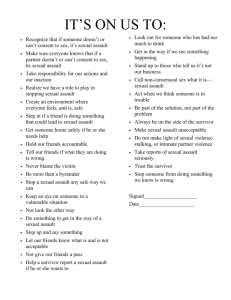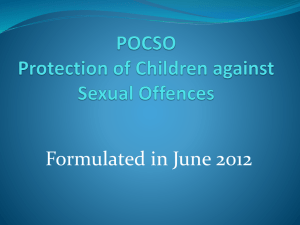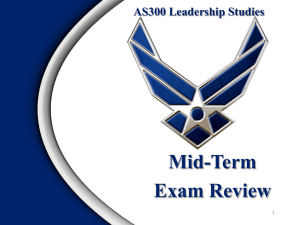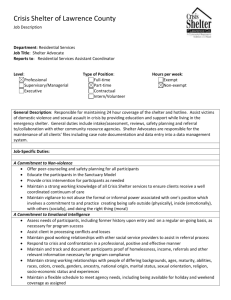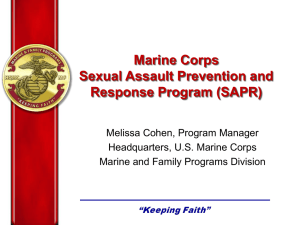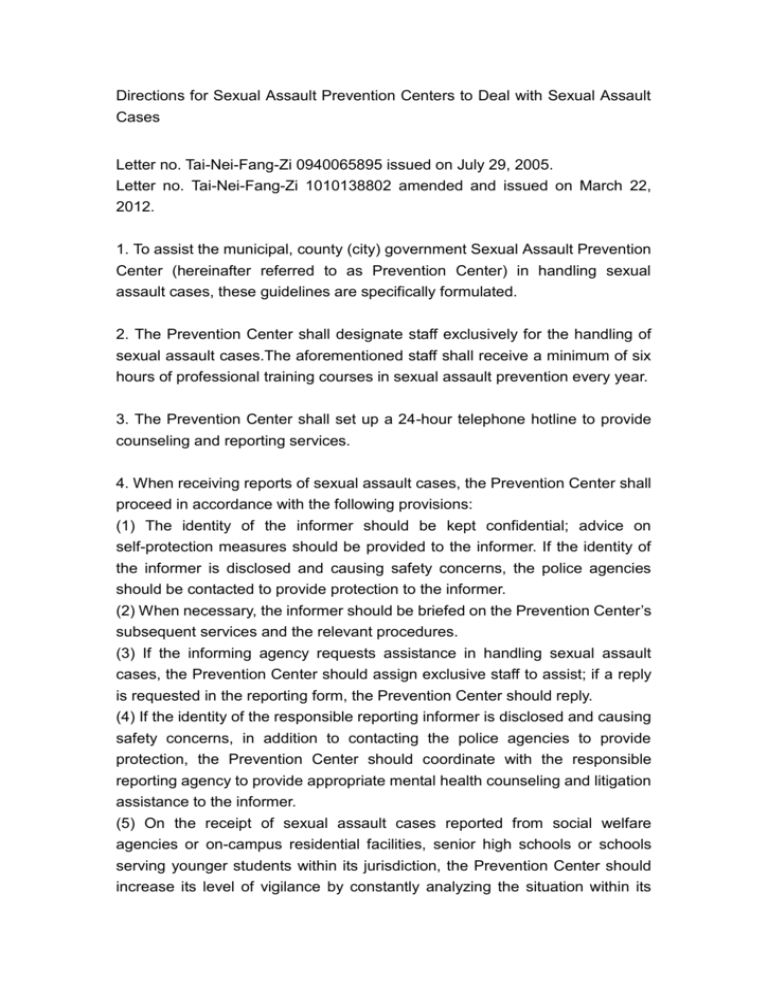
Directions for Sexual Assault Prevention Centers to Deal with Sexual Assault
Cases
Letter no. Tai-Nei-Fang-Zi 0940065895 issued on July 29, 2005.
Letter no. Tai-Nei-Fang-Zi 1010138802 amended and issued on March 22,
2012.
1. To assist the municipal, county (city) government Sexual Assault Prevention
Center (hereinafter referred to as Prevention Center) in handling sexual
assault cases, these guidelines are specifically formulated.
2. The Prevention Center shall designate staff exclusively for the handling of
sexual assault cases.The aforementioned staff shall receive a minimum of six
hours of professional training courses in sexual assault prevention every year.
3. The Prevention Center shall set up a 24-hour telephone hotline to provide
counseling and reporting services.
4. When receiving reports of sexual assault cases, the Prevention Center shall
proceed in accordance with the following provisions:
(1) The identity of the informer should be kept confidential; advice on
self-protection measures should be provided to the informer. If the identity of
the informer is disclosed and causing safety concerns, the police agencies
should be contacted to provide protection to the informer.
(2) When necessary, the informer should be briefed on the Prevention Center’s
subsequent services and the relevant procedures.
(3) If the informing agency requests assistance in handling sexual assault
cases, the Prevention Center should assign exclusive staff to assist; if a reply
is requested in the reporting form, the Prevention Center should reply.
(4) If the identity of the responsible reporting informer is disclosed and causing
safety concerns, in addition to contacting the police agencies to provide
protection, the Prevention Center should coordinate with the responsible
reporting agency to provide appropriate mental health counseling and litigation
assistance to the informer.
(5) On the receipt of sexual assault cases reported from social welfare
agencies or on-campus residential facilities, senior high schools or schools
serving younger students within its jurisdiction, the Prevention Center should
increase its level of vigilance by constantly analyzing the situation within its
governing district to respond in a timely manner.
(6) In cases that the victim is a foreign national or unable to communicate well,
the Prevention Center should utilize interpreters to assist.
5. When intervening in sexual assault cases, the Prevention Center should:
(1) Comply with the Assessment Index of Intake and Termination of Sexual
Assault Cases, and Direction for the Jurisdiction and Division of Work
Regarding Sexual Assault Cases, formulated by the central governing
authority.
(2) Be aware of the physical and mental condition of the victim, and give timely
and proper assistance.
(3) Provide assistance if the victim is in need of emergency placement.
(4) Provide assistance if the victim is in need of legal aid, psychotherapy and
counseling; vocational training, and employment or schooling services.
(5) Not decline requests made by the victim, the victim’s guardian or legal
representative, to be accompanied by social workers designated by the
Prevention Center during the investigation, trial, medical diagnosis and
evidence collection of the sexual assault case, unless it is obviously
unnecessary.
(6) Coordinate with relevant professional bodies to design appropriate
treatment programs for victims that are under special circumstances.
6. For behaviors of children and adolescents that violate Paragraph 1, Article 2
of the Sexual Assault Prevention Act, the Prevention Center shall combine
appropriate resources to provide assistance on a case-by-case basis.
7. With regard to victims who are workers of foreign nationality (hereinafter
referred to as foreign workers), the following provisions shall apply:
(1) Apart from providing relevant protection and support measures, when
necessary, the Prevention Center shall coordinate with organizations related to
foreign workers, to assist in translation and advice on foreign workers’
interests.
(2) The Prevention Centre should inquire the foreign worker about his/her
needs and wishes, contact respective municipal or county (city) authority of
labor affairs to assist, and fill out the Foreign Laborer Sexual Assault Case
Contact Sheet, produced by the Bureau of Employment and Vocational
Training under the Council of Labor Affairs of the Executive Yuan. The contact
sheet should be faxed as confidential to the business liaison counter in charge
of sexual assault cases of foreign workers, which is set up by local governing
authorities of labor affairs, in order to help the victim in matters including
translation, emergency placement, legal advice, litigation subsidy,
arrangement for foreign workers to change employers or return to home
country, and handling labor disputes.
8. On occasions when the victim needs to be interviewed or questioned, the
Prevention Center should, at the request of the victim, assist him/her to petition
for such proceedings outside the court before the hearing, or use
sound-and-image transferred technology equipment, or other appropriate
segregation measures, to separate the victim from the defendant, the judge, or
military judges.
9. Unless otherwise provided by law or regulation, the handling of sexual
assault cases by the Prevention Center personnel shall follow the principle of
confidentiality; any information regarding the victim may not be disclosed.
The preceding provision also applies to volunteers, temporary staff, and
substitute services draftees in the Prevention Center, and staff of the
commissioned relevant agencies, schools, and organizations.
10. To promote sexual assault prevention organizations, the Prevention Center
shall recruit volunteers to assist, and regularly organize or encourage
volunteers to participate in sexual assault prevention education and training.
11. For those accepted sexual assault cases in which the victims are children
or adolescents, the Prevention Center should take into account the nature of
the cases and handle the cases in coordination with the provisions in Articles
53 and 57 of the Protection of Children and Youths Welfare and Rights Act, or
Articles 9 and 15 of the Child and Youth Sexual Prevention Act.
12. The Prevention Center should proactively collaborate with relevant
agencies including justice, police, social affairs, health, education, labor affairs,
and immigration, establish online cooperation and coordination mechanisms,
and hold routine and emergent liaison meetings.
13. The Prevention Center should strengthen coordination and links across
professions among reporting agencies, and coordinate with their governing
authorities to investigate cases of which the reporting duty is poorly performed.
14. The Prevention Center should expand publicity regarding prevention of
sexual assault, strengthening community-based outreach, reporting,
recognition and awards.

